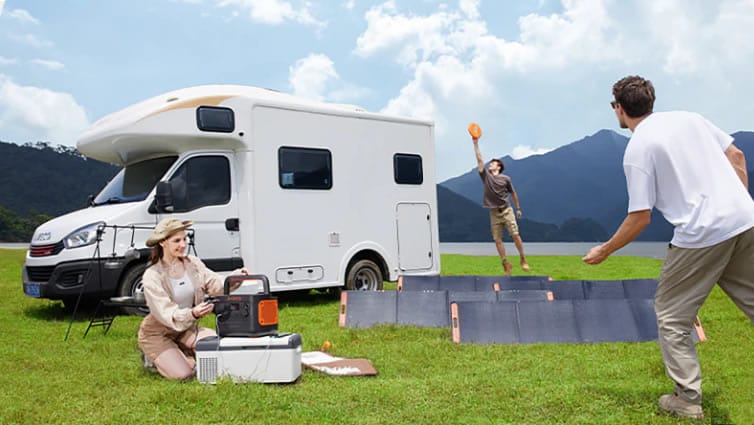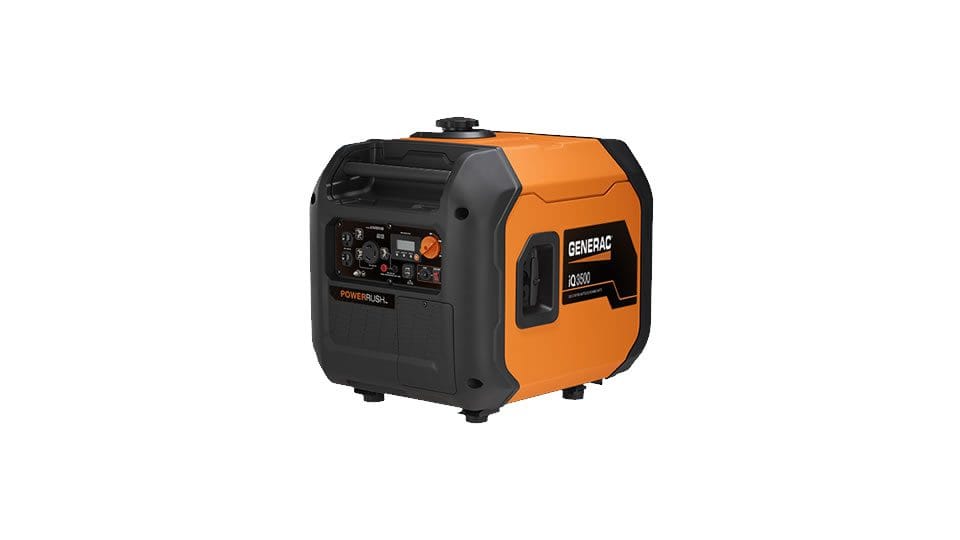Introducing Portable Generator for RV
Portable generator for RV adventures brings unmatched convenience and reliability to your travels. Whether you’re exploring remote campsites or parking at RV parks, having a generator ensures you stay powered up no matter where you are. From running essential appliances to charging devices, it makes off-grid living comfortable and stress-free.
Investing in the right portable generator for RV use can transform your road trips. With options tailored to fuel efficiency, quiet operation, and compact designs, these generators cater to every traveler’s needs. Enjoy the freedom to roam without worrying about power outages or limited electricity access!
Mastering Fuel Efficiency on the Road
Fuel efficiency is a game-changer when you’re using a portable generator for RV adventures. No one wants to run out of power—or fuel—in the middle of nowhere. Mastering the art of fuel efficiency helps you save money, reduce environmental impact, and keep your generator running smoothly. Let’s explore practical ways to get the most out of every drop of fuel.
Choose the Right Generator for Your RV
Fuel efficiency starts with picking the right generator. A generator that’s too small may struggle, while one that’s too large wastes fuel. Matching the generator to your RV’s power requirements ensures you’re not overloading or underutilizing it.
Check your RV appliances’ wattage and pick a generator with a capacity slightly higher than your total needs. This balance helps your generator run efficiently without consuming unnecessary fuel. A dual-fuel generator can also give you the flexibility to switch between fuel types based on availability and cost.
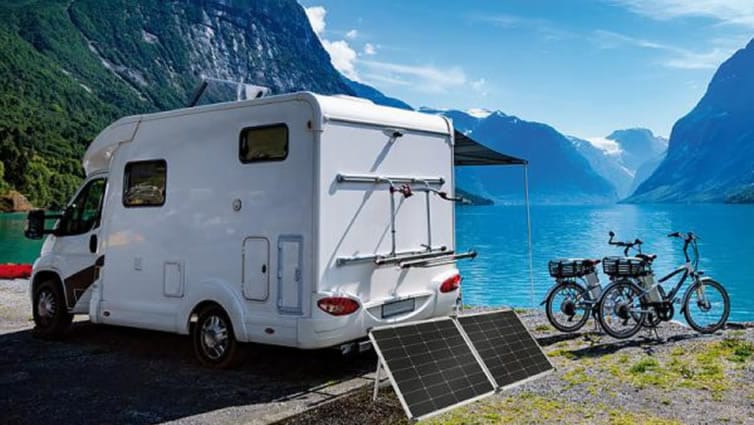
Run Only What You Need
One of the easiest ways to save fuel is to avoid running unnecessary devices. Before starting your portable generator for RV use, think about what truly needs power. Focus on essentials like your fridge, lights, and maybe a fan, especially if you’re camping off-grid.
Try not to run everything simultaneously. Staggering the use of high-wattage appliances like microwaves or electric heaters can reduce the overall load and fuel consumption. With a little planning, you’ll have enough power for everything without wasting fuel.
Maintain a Steady Generator Load
Running your generator at a steady, moderate load is much more fuel-efficient than fluctuating between high and low demands. Generators perform best when operating at around 50-75% of their maximum capacity.
To achieve this balance, monitor your power usage and unplug devices you’re not actively using. You might also want to invest in a wattage meter to keep an eye on your generator’s load. By maintaining steady use, you’ll not only save fuel but also extend your generator’s lifespan.
Keep Your Generator Well-Maintained
A well-maintained generator runs more efficiently, which means less fuel wasted on inefficient performance. Regularly check the oil levels, air filter, and spark plugs to ensure everything is in good condition.
Clean the generator’s exterior to prevent dust and debris from clogging the engine or vents. If you’re using a portable generator for RV trips frequently, consider scheduling professional servicing at least once a year. A little TLC goes a long way in improving fuel efficiency and overall reliability.
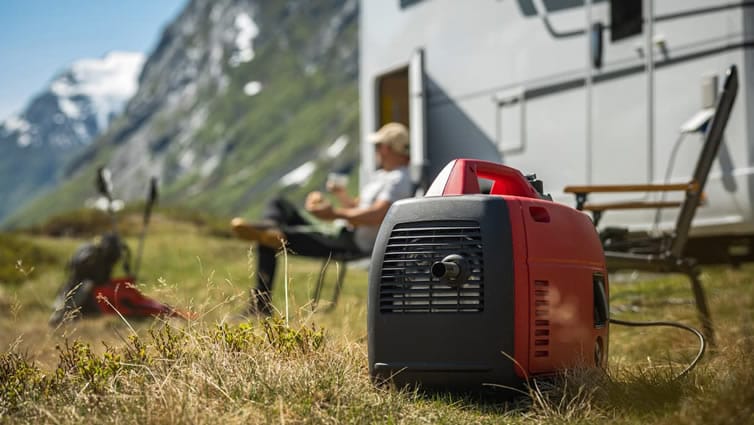
Opt for Energy-Efficient Appliances
Pairing your generator with energy-efficient RV appliances is a win-win for your fuel budget and the environment. For instance, LED lights consume significantly less power than traditional bulbs while providing the same brightness.
Look for Energy Star-rated appliances when upgrading your RV gear. These devices are designed to work effectively with less power, meaning your generator doesn’t have to work as hard to keep things running.
Use the Eco Mode
Many modern portable generators come equipped with an eco-mode feature, which automatically adjusts the engine speed based on the power load. Using this mode can significantly reduce fuel consumption during lighter loads, such as charging phones or powering LED lights.
Eco mode is perfect for quiet hours or when you only need minimal power. Just make sure to switch it off when using high-wattage appliances to avoid performance issues.
Watch Out for Fuel Quality
Good fuel equals good performance. Always use fresh, high-quality fuel to keep your portable generator for RV trips running efficiently. Stale fuel can gum up the engine and make it work harder, burning through more fuel than necessary.
If you’re storing fuel for a while, add a fuel stabilizer to prevent it from degrading. This is especially important for long road trips where you might not need the generator daily. With stabilized fuel, you can be confident your generator will start smoothly and run efficiently when needed.
Plan Refueling Stops Strategically
Running out of fuel in the middle of nowhere isn’t fun, so it’s important to plan your refueling stops ahead of time. Research gas stations along your route and note those with lower prices.
Carrying a spare, approved fuel container can also be a lifesaver on remote trips. Just ensure you store it securely in a well-ventilated area, away from direct sunlight or heat sources.
Every Drop Counts
Fuel efficiency doesn’t have to be complicated. By choosing the right generator, managing your power load, and maintaining your equipment, you can make every drop of fuel count. Small changes, like using eco-mode or energy-efficient appliances, can add up to big savings over time.
When you master fuel efficiency, your portable generator for RV adventures becomes an even better companion. You’ll save money, reduce stress, and enjoy uninterrupted power wherever the road takes you. So, gear up, plan smart, and let your generator work its magic without guzzling gas!
Smart Power Management for RV Essentials
When it comes to camping or road tripping in your RV, managing your power efficiently is key. A portable generator for RV use can make your trips more comfortable by providing the energy you need, but smart power management ensures that you’re using that power wisely. From running your fridge to charging your devices, understanding how to distribute and conserve power will not only extend your generator’s runtime but also help you avoid overloading your system. Let’s dive into some tips for keeping your RV essentials powered up while keeping fuel usage to a minimum.

Prioritize Your Power Needs
One of the first steps in smart power management is prioritizing your RV’s essential power needs. When you’re off the grid, you can’t afford to run everything at once, so it’s important to think ahead about what needs to be powered most urgently. For example, your refrigerator, lights, and any medical equipment should take precedence over things like the TV or hairdryer.
A simple way to approach this is by creating a power priority list. Decide which appliances or devices you absolutely need to function throughout the day and night. This method ensures that your portable generator for RV use is focused on keeping your essentials running while minimizing the power consumption of non-essential items.
Use Energy-Efficient Appliances
When choosing RV appliances, energy efficiency should be at the top of your list. Many modern devices are designed to consume less power while still providing the same level of performance. For instance, swapping out old incandescent light bulbs for energy-efficient LED bulbs can save you a significant amount of power over the course of your trip.
Also, consider switching to energy-efficient versions of essential RV appliances, like your water heater or air conditioner. These appliances are built to maximize power output without demanding too much from your generator. By using low-energy versions of these essentials, you’ll be able to stretch your fuel and battery life further, ensuring a more efficient use of your portable generator for RV travel.
Utilize Solar Power for a Boost
If you’re looking to go the extra mile with power management, consider integrating solar panels into your RV setup. Solar power can provide a steady, eco-friendly boost to your generator, allowing you to use less fuel. By setting up a small solar system to charge your batteries during the day, you reduce the strain on your portable generator for RV use during the night.
Solar panels can be used to charge devices, run small appliances, or top off your RV’s battery bank. Not only does this help conserve fuel, but it also means you’re less reliant on your generator, extending its overall lifespan and reducing wear and tear. Solar power can be particularly beneficial for maintaining low-power devices like lights, fans, and phone chargers while saving the generator for heavier demands.
Monitor Your Power Consumption
To keep track of how much power you’re using, invest in a wattage meter or a power monitor. These devices allow you to see exactly how much power each of your RV appliances is consuming in real-time. With this information, you can make informed decisions about what to power and when.
Monitoring your power consumption also helps you avoid overloading your generator, which can be damaging to the equipment and waste fuel. Keeping an eye on your usage helps you plan ahead, so you’re never left in the dark with a dead battery or an overheated generator.
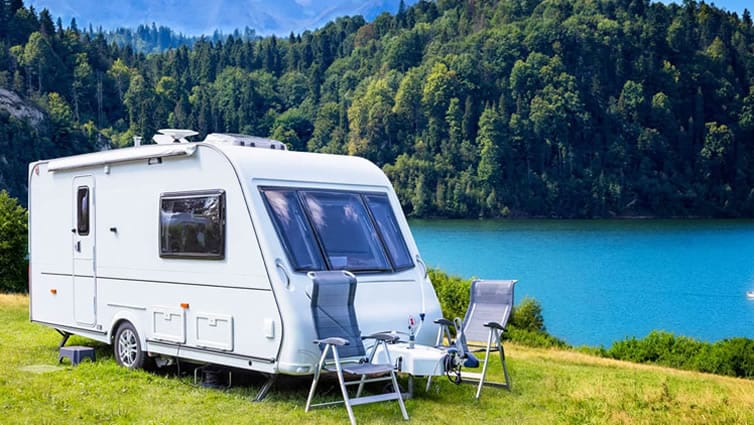
Utilize Generator Eco-Mode
Many modern portable generators for RV trips come equipped with an eco-mode feature. Eco-mode is designed to automatically adjust the generator’s engine speed based on the power load. If your power needs are low, the generator will slow down, conserving fuel and reducing noise. This is particularly useful when you’re only running lights, small appliances, or charging devices.
By utilizing eco-mode, you’re not only saving on fuel but also extending the life of your generator. It’s a great feature for quieter, more fuel-efficient operation when you don’t need to run the generator at full capacity. It’s the perfect setting for low-energy days or when you’re trying to maximize the amount of power you can get from your generator.
Invest in a Smart Inverter Generator
If you’re serious about maximizing power efficiency, consider investing in an inverter generator. These generators are more fuel-efficient than traditional models and provide cleaner, more stable power, which is essential for sensitive electronics. An inverter generator adjusts its output to match the power demand, which means it only uses the amount of fuel necessary to power your devices. This allows for more precise control over your RV’s energy needs.
Inverter generators are also typically quieter and more portable, making them ideal for RV camping. While they may come with a higher price tag, the long-term fuel savings and added convenience are often worth the investment.
Smart Power Management for Better RV Experiences
Smart power management isn’t just about saving fuel—it’s about enhancing your overall RV experience. With the right strategies, such as prioritizing essential power needs, using energy-efficient appliances, and monitoring your power consumption, you can stretch every gallon of fuel further and keep your RV running smoothly.
By integrating solar power, using eco-mode, and investing in advanced technology like inverter generators, you can ensure that your portable generator for RV stays efficient, reliable, and ready for the road ahead. With a little planning and the right equipment, you’ll be able to enjoy your adventures without worrying about power issues, making your camping trips all the more enjoyable.
Choosing the Perfect Generator Size
When you’re gearing up for an RV trip, choosing the right size generator is key to a smooth adventure. The last thing you want is to have a generator that’s either too small to meet your needs or too large to be efficient and manageable. Understanding how to select the ideal portable generator for RV travel is crucial to ensuring you have enough power for your appliances without wasting fuel or space. Let’s break down the steps for choosing the perfect generator size for your RV journey.
Understand Your Power Needs
Before diving into the world of portable generators, it’s important to know how much power you’ll actually need. Start by listing the RV appliances and devices you plan to use. This includes everything from lights and fans to kitchen appliances and your refrigerator. Each appliance has a specific power requirement measured in watts, and it’s essential to know the starting and running wattage for each one.
The starting wattage refers to the extra power needed when you first turn on an appliance, while the running wattage is what it requires to stay on. For instance, an RV air conditioner might require 2,000 watts to start but only 1,000 watts to run. Once you have this information, add up the total wattage required for all of your appliances. This will give you a ballpark figure of the generator size you need.
Choose a Generator with Extra Capacity
It’s always a good idea to choose a portable generator for RV use that has a little extra capacity above your total wattage needs. Ideally, you want a generator that can handle 20-30% more than the total wattage you calculated. Why? This extra headroom ensures that your generator won’t be working at maximum capacity all the time, which can lead to wear and tear or overheating.
For example, if your total wattage requirement is 3,000 watts, consider a generator rated for 3,600 watts or more. This gives you some breathing room and prevents your generator from struggling, especially when additional devices are plugged in or when the load fluctuates.
Portability and Storage Space
While the size of the generator is important for power output, its physical size and weight are equally crucial. Depending on your RV’s storage capacity and how much space you have available, you may want to opt for a more compact, lightweight model.
A portable generator for RV trips typically ranges in size, with some being small enough to fit in an RV’s storage compartment, while others may require more space. Remember, a larger generator provides more power, but it’s also bulkier and may take up valuable storage room. Consider how often you’ll be using the generator and whether you have the room to accommodate it without compromising the comfort of your RV setup.
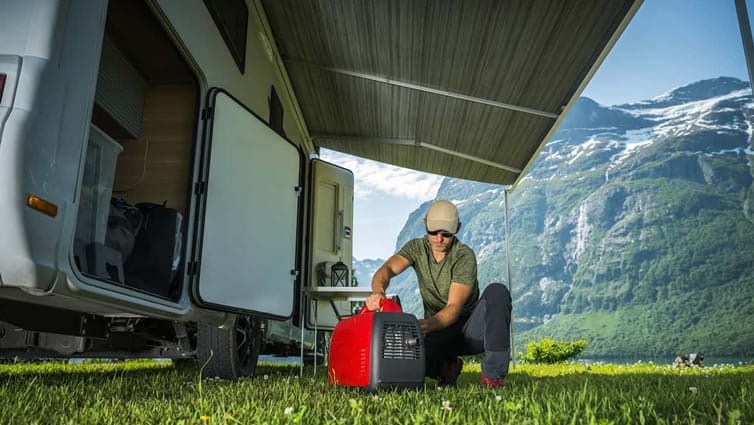
Consider Fuel Type and Efficiency
Choosing the right fuel type can also affect the size and performance of your portable generator for RV use. Most RV generators run on gasoline, but propane or dual-fuel models are also available. Gasoline generators tend to be the most common and are widely available, but they can be less fuel-efficient, especially for larger models.
Propane generators offer the advantage of cleaner fuel and can be more efficient, but they may require a larger tank for extended use. Dual-fuel generators give you flexibility, allowing you to switch between gasoline and propane depending on availability. Each fuel type has its pros and cons, so it’s important to balance your generator’s size and fuel efficiency to suit your travel needs and preferences.
Think About Noise Levels
Generators are essential for providing power, but they can be noisy, especially during the night when you’re trying to sleep or relax. While you’re considering the size of your portable generator for RV use, don’t forget to factor in the noise level. Most portable generators produce a certain decibel level, which is a measure of how loud the generator runs.
If you’re camping in remote areas or near other RVs, you’ll want a quieter generator to avoid disturbing the peace. Inverter generators are typically quieter and more efficient than traditional models, so if noise is a concern, look for one of these. They’re also a great option for running sensitive electronics without the risk of power surges.
Think About Runtime
Another factor to consider when choosing the right generator size is its runtime. A portable generator for RV should provide sufficient power throughout the day or night without needing constant refueling. The runtime of a generator is usually measured in hours, and it depends on both the fuel capacity and the power load.
If you’re planning longer trips off the grid, you’ll want a generator with a longer runtime. For instance, a generator with a 6-hour runtime at a 50% load might be enough for short trips, but for extended stays, look for one that can run for 12 hours or more. Make sure to take your typical daily power consumption into account when considering how often you’ll need to refuel.
Get the Right Balance
Choosing the right generator size for your RV is all about finding the right balance. You want a generator that meets your power needs without being overkill. It should be compact enough to fit into your storage space but powerful enough to handle your essential appliances. By understanding your power needs, choosing a generator with extra capacity, considering fuel efficiency, and factoring in noise levels and runtime, you’ll ensure that your portable generator for RV use works as efficiently as possible.
Remember, every RV trip is unique, and so are your power needs. With a little research and consideration, you’ll find the perfect generator size that makes your travels comfortable, convenient, and powered up.
Maintenance Hacks for Long-lasting Generators
Your portable generator for RV is an essential tool for smooth, off-grid adventures. However, just like any piece of equipment, it requires regular maintenance to keep it running efficiently for years to come. Whether you use it occasionally for weekend getaways or frequently for longer trips, taking proper care of your generator will ensure you get the most out of it. Fortunately, maintaining a generator isn’t as complicated as it might sound. With just a few simple tips and tricks, you can extend its life and avoid common issues that may arise on the road.
Keep It Clean and Dry
The first rule of keeping your portable generator for RV in top shape is cleanliness. Dirt, dust, and moisture can cause problems like overheating, engine damage, and blocked air vents. It’s crucial to clean your generator regularly to avoid such issues. After every use, make sure to wipe down the exterior with a dry cloth to remove any dust or debris. For more thorough cleaning, use a mild detergent and water to clean the vents, filters, and exterior parts.
Ensure that the generator stays dry, especially if you’re storing it in a damp environment like a storage compartment. Moisture can lead to rust and corrosion, which will significantly reduce the lifespan of your equipment. Always cover your generator with a waterproof tarp when storing it outside, and if possible, keep it in a dry, well-ventilated area to prevent moisture buildup.
Change the Oil Regularly
One of the simplest yet most important maintenance tasks for your portable generator is changing the oil. Just like a car engine, the generator’s engine relies on oil to stay lubricated and run smoothly. Over time, the oil can become dirty or break down, which reduces its ability to keep the engine cool and lubricated.
Most experts recommend changing the oil after the first 20-30 hours of use for a brand-new generator, then every 100-150 hours of operation afterward. However, if you’re using your generator for frequent or heavy-duty tasks, you might need to change the oil more often. Always refer to the manufacturer’s guide for specific recommendations on oil types and change intervals. Changing the oil regularly will help prevent engine damage and keep your generator running smoothly for years.
Check the Air Filter
Another critical maintenance hack is checking and replacing the air filter. The air filter keeps dirt and debris from entering the engine, helping it run efficiently. If the filter gets clogged, it can restrict airflow and cause the generator to overheat or even stall.
For most portable generators, the air filter should be checked every 50-100 hours of use. If it’s dirty, simply remove it, clean it with compressed air or wash it with soap and water, and let it dry before reinstalling it. If the filter is too damaged or clogged to clean, it’s best to replace it. A clean air filter ensures that your generator gets enough airflow to operate at peak performance and reduces the chances of engine failure.
Maintain the Fuel System
Maintaining the fuel system is essential for ensuring that your portable generator for RV continues to run without issues. Fuel can degrade over time, especially if it’s stored for long periods, leading to clogged fuel lines and a sluggish engine. To avoid these problems, always store your generator with fresh fuel and add a fuel stabilizer if you plan to store it for an extended period.
When you’re preparing to use your generator, make sure to check the fuel lines for any cracks or leaks. If you notice any damage, replace the fuel lines before starting the generator. Additionally, consider draining the fuel tank if you’re storing the generator for more than a month, as old fuel can cause engine performance issues.
Test the Generator Regularly
Even if you’re not using your portable generator for RV frequently, it’s still a good idea to run it periodically to keep it in working condition. Regularly starting the generator ensures that the engine components stay lubricated and prevents them from seizing up.
Run your generator for about 30 minutes every month, even if you’re not on a camping trip. This will help keep the engine’s internal parts moving and maintain the generator’s functionality. During these test runs, check for any unusual noises or smells that could indicate an underlying problem. If everything seems fine, your generator will be ready to go when you need it.
Store It Properly for Longevity
When not in use, proper storage is essential for extending the lifespan of your portable generator for RV. Ideally, you should store the generator in a cool, dry place, away from direct sunlight or extreme temperatures. If you’re storing the generator for the winter or during off-season months, make sure to disconnect the battery and drain any remaining fuel to prevent corrosion and fuel degradation.
If you’re storing the generator outside, invest in a high-quality generator cover to protect it from the elements. A weatherproof cover shields your generator from rain, snow, and sun damage, ensuring that it’s ready to go when the next adventure calls. Proper storage helps prevent rust, engine wear, and fuel system problems, so your generator is in top shape for the next trip.
Regularly Inspect the Spark Plug
The spark plug is one of the most important components of your portable generator for RV, as it ignites the fuel and air mixture inside the engine. Over time, spark plugs can become worn, corroded, or fouled with carbon buildup, leading to starting issues or poor engine performance.
To keep your generator running smoothly, inspect the spark plug every 100 hours of use. If it looks dirty or damaged, clean it with a wire brush or replace it with a new one. A fresh spark plug will improve starting performance and help the engine run more efficiently.
Keep Your Generator Running Like New
Regular maintenance is key to ensuring your portable generator for RV remains in top working condition. By following these simple hacks—such as cleaning the generator, changing the oil, maintaining the fuel system, and testing it regularly—you can keep your generator running efficiently for years to come. With a little care and attention, your generator will be ready to power all your RV essentials on every adventure, providing you with the peace of mind you need to enjoy the great outdoors without worry.
Frequently Asked Questions (FAQs for portable generator for an RV):
What is the best portable generator for an RV?
The best portable generator for an RV depends on your power needs. Key factors to consider are the wattage capacity, fuel type, and noise level. Popular choices include inverter generators for their quiet operation and efficiency.
How do I choose the right portable generator for my RV?
To choose the right generator, calculate the wattage required for your RV’s appliances and devices. Opt for a generator with slightly higher capacity than needed, and consider fuel efficiency, noise levels, and portability.
Can I use a portable generator while driving my RV?
Yes, portable generators can be used while driving, provided they are securely stored in a well-ventilated space and follow safety guidelines. Always turn off the generator when refueling to avoid safety hazards.
What size generator do I need for a 30 amp RV?
A 30-amp RV typically requires a generator that provides around 3,000 to 3,500 watts of continuous power. Ensure the generator can handle peak loads like air conditioners or microwaves.
Can a portable generator power an RV air conditioner?
Yes, a portable generator can power an RV air conditioner, but it must provide enough wattage. Most RV air conditioners need between 1,500 to 3,500 watts, depending on the unit’s size.
How long will a portable generator run on a full tank?
The runtime of a portable generator depends on its size and fuel type. On average, a 2,000-watt generator runs for 4-10 hours on a full tank, while larger models can run for 8-20 hours.
Are inverter generators better for RVs?
Inverter generators are generally better for RVs because they are quieter, more fuel-efficient, and provide clean power ideal for sensitive electronics like laptops and TVs.
What fuel type is best for a portable RV generator?
Common fuel types for RV generators include gasoline, propane, and diesel. Gasoline is widely available, while propane is cleaner and more efficient. Diesel generators tend to be more durable and have a longer lifespan.
How noisy are portable generators for RVs?
Noise levels vary depending on the generator’s type and size. Inverter generators tend to be quieter, with noise levels around 50-60 dB, making them ideal for camping in quiet areas.
Can I use a portable generator in a campground?
Yes, portable generators are allowed in most campgrounds, but be mindful of noise restrictions. Inverter generators are usually preferred for their quieter operation.
